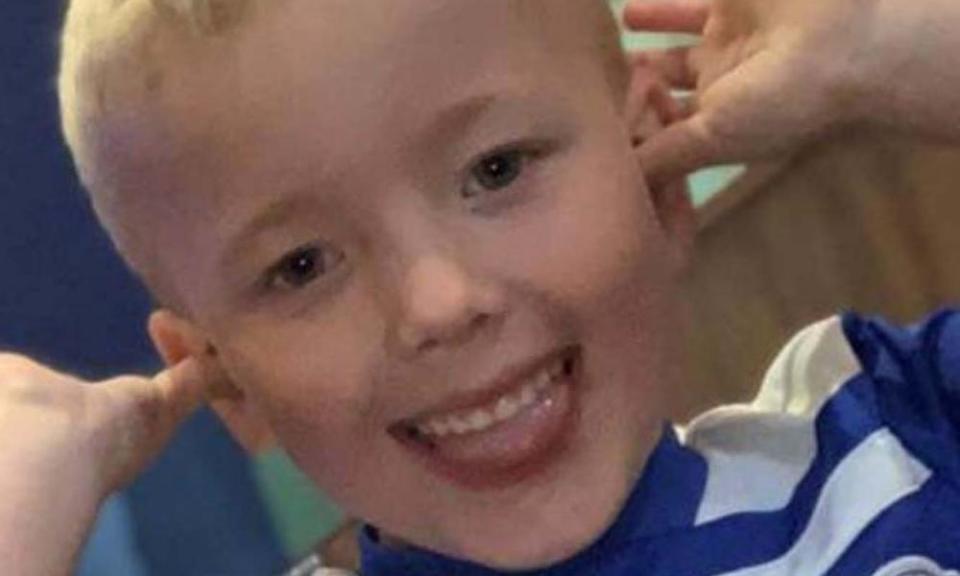Arthur Labinjo-Hughes: injuries suggested treatment ‘amounting to torture’

The misery and abuse suffered by six-year-old Arthur Labinjo-Hughes in the weeks leading up to his violent death in June 2020 is difficult to comprehend.
At the hands of his father and stepmother, Arthur was physically assaulted, poisoned and dehumanised over a number of months during lockdown. By the time he died, with more than 130 injuries on his body, experts said his condition met the medical definition of child torture.
“It’s certainly the worst [child abuse case] I’ve had to investigate,” said DI Laura Harrison from West Midlands police, who led the case. “We don’t often see what goes on behind closed doors, but on this occasion we did.”
One of the reasons the case was particularly shocking and graphic was the level of “intimate” evidence available to police, Harrison said. Unusually, there was a CCTV camera in the family living room – set up by Tustin to monitor Arthur’s behaviour, she claimed – which showed the boy being forced to sleep on the floor without a mattress.
Police also used it to work out how long Arthur was forced to stand in isolation in the hallway without food or water – up to 14 hours a day.
Related: Arthur Labinjo-Hughes: father and partner found guilty of killing son, six
Tustin had more than 200 audio recordings of Arthur in distress on her phone, including two particularly horrific clips in which the boy could be heard crying “No one loves me” and “No one is going to feed me”. Many of these were sent to Hughes, who encouraged Tustin’s abuse. “Just end him,” he responded one day.
“What that did is give us a real visual and verbal representation of the abuse that Arthur suffered,” said Harrison. “Ordinarily, both the police and the wider public are protected a little bit from the horrific nature of [child abuse], whereas on this occasion it was thrust in our faces. It just makes it really real, and so much more distressing.”
The prosecution argued that Arthur was subjected to “incomprehensible and escalating cruelty” in the weeks up to his death, including being poisoned with salt-laced drinks and food.
Giving evidence during the eight-week trial at Coventry crown court, the children’s doctor Jayaratnam Jayamohan said Arthur’s salt levels were the highest he had ever seen. It is thought he consumed at least six and a half teaspoons of salt on the day he was fatally injured.
Tustin, although she admitted two counts of child cruelty, has continuously claimed that Arthur was badly behaved and aggressive, and said his fatal injury was self-inflicted.
Medical evidence determined that Arthur died from “head trauma inflicted on him by an adult”, with the most likely cause that he had been “vigorously shaken and had his head banged repeatedly against a hard surface”.
Following the guilty verdicts, questions will now be raised over how such extreme child abuse was able to go undetected for so long. A review of the role of social services is under way, while an investigation by the Independent Office for Police Conduct is expected to report back shortly.
The effect of lockdown is likely to be a crucial factor.
Hughes took over sole responsibility for Arthur after the boy’s mother, Olivia Labinjo-Halcrow, was arrested in 2019 for killing her abusive partner. When the Covid lockdown was announced in March 2020, Hughes decided to move in with his new partner, Tustin, and her two young children at their home in Solihull, and by April social services and police had visited following concerns raised by family members.
Arthur’s grandmother, Joanne Hughes, told the court the family handed over pictures of bruises they found on the boy to the police and social services, but nothing was done, and his uncle, Daniel Hughes, was even told he could be prosecuted under lockdown rules if he persisted in trying to visit Arthur at home.
“The usual professionals that should have been involved in safeguarding a child weren’t because of the lockdown,” said Harrison. “You would hope in this day and age that all the professionals work together to make sure that something like this can’t happen, and it shouldn’t happen.”
She added that the lockdown restrictions could also have affected the level of involvement of Dickens Heath community primary school, which Arthur attended.
During the trial, the teaching assistant Sarah Turrell said the school was aware that Joanne Hughes had made a referral to social services last April. She called Thomas Hughes the same day, but he said “he had no concerns” and that Arthur was “playing happily in the garden”.
Data has shown that reports of child abuse or neglect rose by a quarter after England’s first lockdown last year.
Harrison added that while ongoing investigations should determine what went wrong with Arthur’s case, it shouldn’t be forgotten how Hughes and Tustin manipulated the system to avoid their abuse being detected. For instance, they allowed Arthur to play in the garden on the day of a social services visit and told them the bruises on his body were incurred from playing.
After the visit, social services concluded there were “no safeguarding concerns”.
In a tribute written from prison, Labinjo-Halcrow said her son, a huge fan of Marvel and DC superheroes, should be remembered for one thing: “If Arthur could ask for one last thing, it would be that he was remembered for his superpower. That will always be what I remember, and Arthur’s superpower was his smile.”

 Yahoo News
Yahoo News 